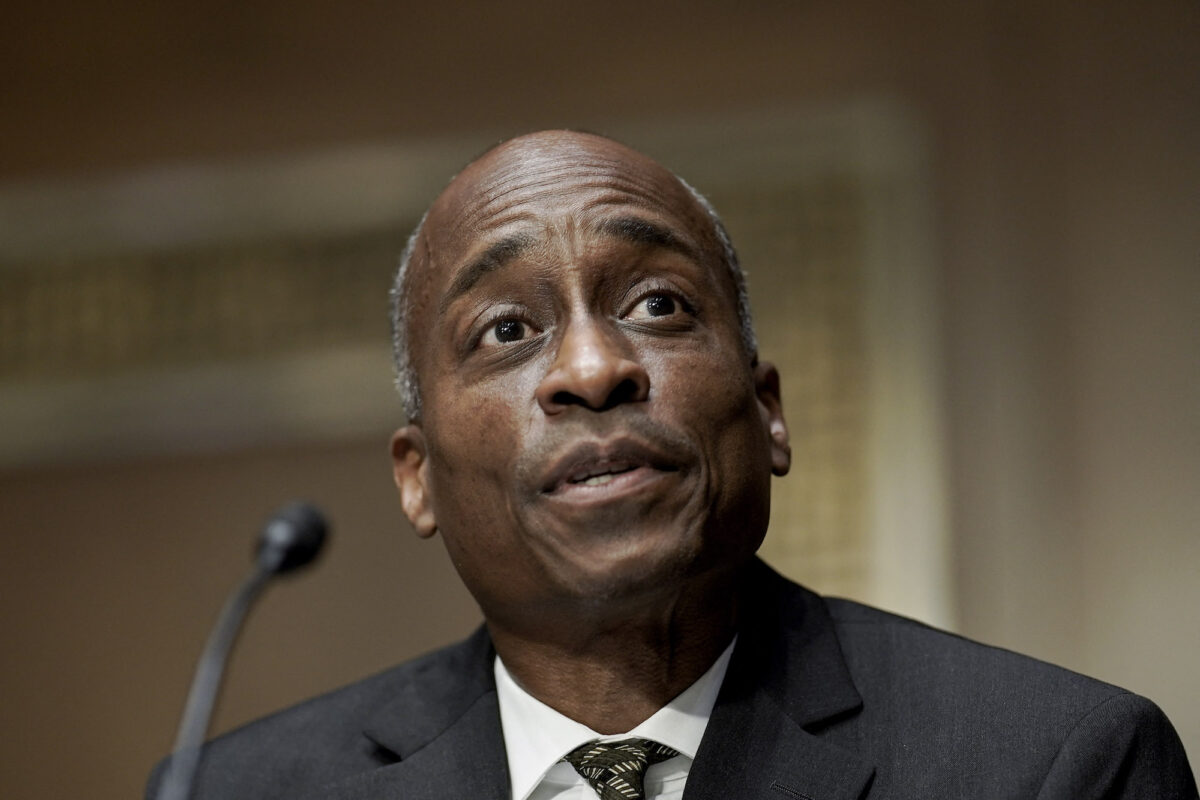


Federal Reserve Governor Philip Jefferson has been nominated by President Joe Biden to serve as the central bank’s next vice chair.
If confirmed by the Senate, Jefferson would replace Lael Brainard, who resigned from her position in February to become the president’s chief economic adviser. He was widely expected to become the next Fed’s second in command before the announcement.
The White House announced on May 12 that the president plans to nominate Adriana Kugler, a Georgetown University economist and the World Bank Group Executive Director for the United States, to serve as a member of the Fed’s Board of Governors. Biden also intends to renominate Lisa Cook, who was confirmed by the Senate last year, to a full term on the Board of Governors.
“Dr. Jefferson and Dr. Cook will continue to bring valuable insight, expertise, and continuity to the Fed at a critical time for our economy and families across the country,” the president said in a statement.
“These nominees understand that this job is not a partisan one, but one that plays a critical role in pursuing maximum employment, maintaining price stability, and supervising many of our nation’s financial institutions. I am confident these nominees will help build upon the historically strong economic recovery we have had under my Administration.”
Rep. Patrick McHenry (R-N.C.), the House Financial Services Committee Chair, welcomed the decision, urging the nominees to “maintain strict impartiality and remain laser-focused on reining in inflation.”
“These nominees are seasoned economists with the capacity to contribute meaningfully to the work of the Federal Reserve Board,” he said in a statement, adding that Republican committee members will hold the nominees to account to ensure they are “focused squarely on its statutory mandate” instead of participating in fiscal or social policymaking.”
Sen. Sherrod Brown (D-Ohio), the Senate Banking Committee Chairman, lauded the “historic nominees.”
“These historic nominees have built their careers by putting workers and communities at the center of our economy. Like so many of the public servants we’ve confirmed to lead our economy over the last two years, Dr. Jefferson, Dr. Cook, and Dr. Kugler—who would be the first Latina to sit on the Fed—reflect the vibrant diversity of our country, and the people who make it work,” said Brown in a statement. “I look forward to working with my colleagues to confirm these nominees quickly.”
This comes as the U.S. central bank employs its quantitative tightening measures while grappling with sticky inflation and a slowing economy. The Fed is also contending with turmoil in the banking sector. At next month’s Federal Open Market Committee (FOMC), policymakers will decide to either continue raising interest rates or hit the pause button on its rate hikes.
Investors mostly expect a rate pause at the June 13-14 meeting, according to the CME FedWatch Tool.
In April, the annual inflation rate eased below 5 percent for the first time in two years. However, the core inflation rate, which eliminates the volatile food and energy components, is proving to be more challenging for officials as it stood at 5.5 percent last month.
Jefferson noted that the U.S. economy is slowing in an “orderly fashion” that would let inflation maintain its downward trend.
“The economy has started to slow in an orderly fashion. I am of the view that inflation will start to come down, and the economy will have the opportunity to continue to expand,” Jefferson said in remarks to the Atlanta Black Chambers business organization on May 9.
He reiterated Fed Chair Jerome Powell’s expectation for a “soft landing,” an event of cooling inflation without a significant decline in economic activity.
In the first quarter, the GDP growth rate came in at 1.1 percent, according to the Bureau of Economic Analysis. The Atlanta Fed Bank’s GDPNow Model estimate suggests the second quarter will record an expansion of 2.7 percent.
Fed economists have warned that the country would slip into a “mild recession” later this year due to the continued fallout from the banking turmoil that has seen the collapse of three banks—Silicon Valley Bank, Signature Bank, and First Republic.
The central bank recently released its much-anticipated senior loan officer opinion survey (SLOOS) on bank lending practices. The report revealed that financial institutions would continue to tighten credit standards for the rest of the year.
“Banks continued to tighten standards in the first quarter, and they expect further tightening as the year progresses, particularly for commercial loans,” said Curt Long, the chief economist and vice president of research at the National Association of Federally-Insured Credit Unions (NAFCU), in a note.
But Jefferson believes tightening lending standards is “typical” for today’s economic cycle.
“We have the data showing that banks have started to raise lending standards and that has contracted the availability of credit,” he said.
“That is typical for where we are in the economic cycle. The credit constraints that you may be now sensing is a natural part of the transmission mechanism of monetary policy.”
